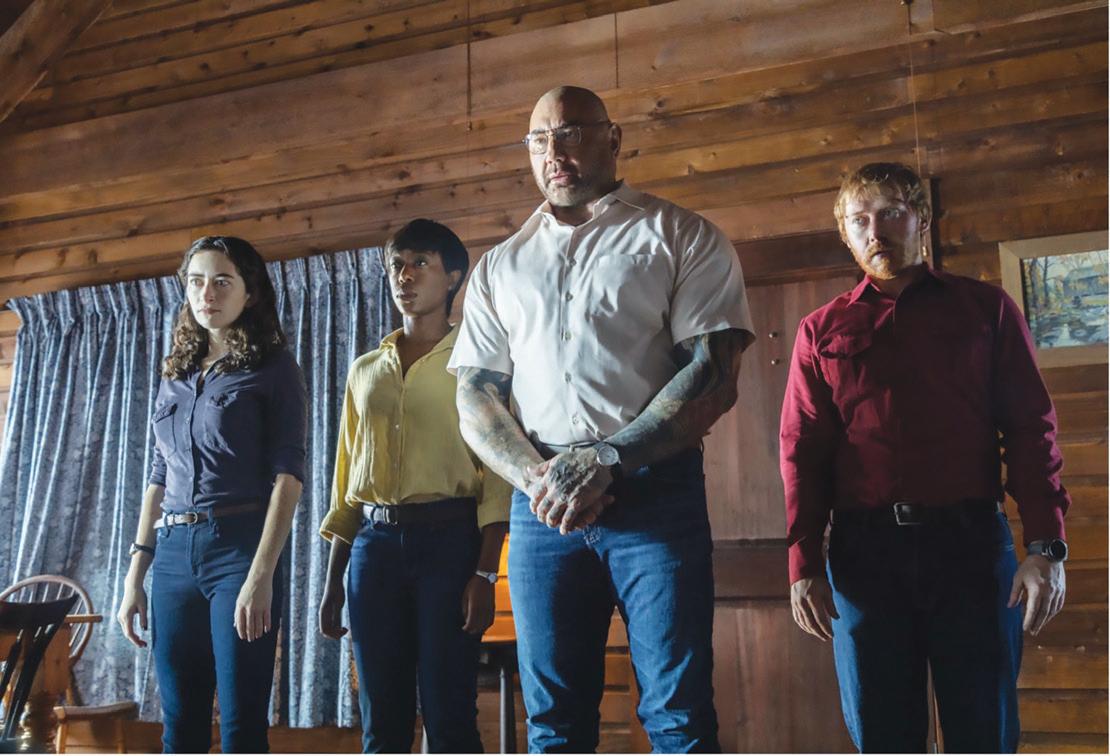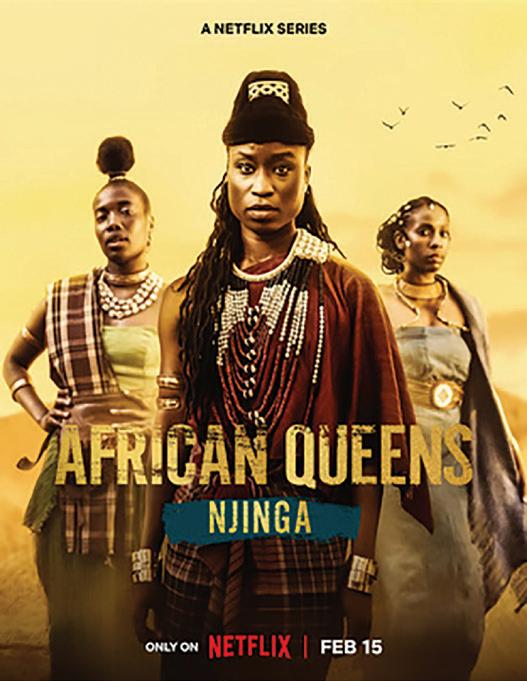
8 minute read
Knock at the Cabin review by Dwight Brown
by Dwight Brown film critic for DwightBrownInk.com and NNPA News Wire
“The Need of Tears!”
Advertisement
By: Lou K. Coleman-Yeboah Lou K. Coleman-Yeboah
After all that has been done and said [ U.S. Apology for Slavery, Jim Crow, July 29, 2008], “Our nation still has need of tears! Tears for all those lynched, maimed, whipped, shamed, and debased by our history of race hatred. Our country has need of tears for those who suffered and for those at whose hands they suffered.” [Albert Raboteau -Author, Slave Religion].
Just because you can, doesn’t mean you should. For some reason veteran hor/thr director M. Night Shyamalan (The Sixth Sense) has decided to put a lot of bad juju vibes out into the world.
If you’re curious, read on.
It’s an unusual premise, but so what. Four strangers (Dave Bautista, Nikki Amuka-Bird, Abby Quinn, Rupert Grint) think really bad things will happen. They feel they’ve been called to stop catastrophes, natural disasters, carnage—and are convinced their mission is noble beyond reproach: “… the most important job in the history of the world.” The only way to stop the impending apocalypse is to ask a couple (Ben Aldridge, Jonathan Groff), who have a child (Kristen Cui), to make a huge life-or-death sacrifice. The messengers of gloom beg, plead and manipulate. Says one: “I don’t have a scar, but if you look inside, you will see that my heart is broken.” So what?
The confrontation occurs in a remote wooded area in Pennsylvania. The menacing quartet knocks on the door of what is called a “cabin,” but looks more like a fancy wooden structure that would rent for a fortune in Bucks County. The married twosome is gay, which is about as forward thinking as the multicultural cast of interlopers. The casting doesn’t feel necessarily exploitative, more like a reflection of life.
However, the script, by Shyamalan, Steve Desmond and Michael Sherman, does over extract from the male/
African Queens: Njinga
of Africans who died in the transatlantic slave trade. Mourn for those black bodies that were subject to unconscionable white enslavement, violence, and oppression. Mourn for those who lived through forms of carnage, mutilation, rape, castration, and injustice that will forever mark the profound ethical failure of this country. For we have not properly mourned nor repented past atrocities afflicted upon us as a people of color. Clearly, a trauma of this magnitude in the life of a people must be acknowledged and mourned before celebration can take place.
male subplot with way too many flashbacks. Background sequences include apprehensive parents, a gay bashing incident and the loving adoption of their Asian daughter. None of it adds much depth to the story, and the frequent lookbacks don’t reveal anything an audience couldn’t already fathom. Also, if this film had stayed in the moment and chronologically developed the narrative bit-by-bit, minuteby-minute, it might have sustained momentum for a full 1h 40m (editor Noemi Katharina Preiswerk). It does not. For horror fans hunting for the newest realm, forget it. Life here on earth is all you get. For sci-fi fans hoping for incredible special effects, a gigantic water plume is the only visual device of interest, and that’s an old trick. There is tension. There is bloodshed. Not like that in a gory slasher film. More in a generic thriller way dotted with repulsion as characters fight for their lives or bite the dust like champs.
It’s noticeable that the camera lens likes to be intrusive, especially in the opening scenes. Closeups on the little girl as she collects grasshoppers and a stranger who approaches her are from mid forehead to chin. It’s an odd device that doesn’t draw you into the characters. It’s just invasive enough to make you notice the technique.
Interiors and exteriors (production design Naaman Marshall), cinematography (Jarin Blaschke, The Northman and Lowell A. Meyer, Servant), costumes (Caroline Duncan) and
Black History
News And Events
Will Be Featured Each Week For The Month Of February
props (Robbie Duncan) don’t’ stand out. If anything, Herdis Stefansdóttir’s heavy bass musical score drones in a way that sounds like a whale dying and it is effective.
As the two dads, Aldridge and Groff have the toughest roles, trying to pull the audience into their plight, standing strong and wavering at moments like any human would who is in shock.
Aldridge has the meatier role and manages to add texture to the dad character whose history of trauma carries the most emotional weight. The four strangers are played by actors who largely don’t distinguish themselves.
Except Bautista, who gets the most screen time and seems a bit deeper than the rest. But he was far more impressive in Glass Onion: A Knives Out Mystery.
Why would any responsible parent put their impressionable kid in a sadistic movie were people are mutilated in front of a little girl? Even if the actress was sheltered from the gruesome stuff, just partially knowing what the film is about has got to be weird for her psyche. She’s a tiny, undeveloped person, how is she
Although the Senate acknowledged “the fundamental injustice, cruelty, brutality, and inhumanity of slavery” and apologized to African Americans, on behalf of the people of the United States, for the wrongs committed against them and their ancestors who suffered under slavery; and although the House of Representatives had passed a similar measure the previous year, Congress could not resolve the two apologies because of differing views on how the resolution would be used in any discussion of reparations. The Senate version was insistent that an apology would not endorse any future claims. The House could not agree. Significantly, the office of the president of the United States has never issued an apology. For a nation that can’t even agree on an apology, there is “The Need of Tears,” because the United States has never given an unconditional apology for slavery.” [Theodore R. Johnson III].
Mourn for the millions
Mourn for the black people who were never meant to be included within the ideal norms of American democracy, yet forced themselves to dream as they faced nightmares, to continue breathing as they were suffocating from the stench of black bodies lynched and burned alive, and who forced themselves to stay alive when suicide would have been easier. [George Yancy]
And just as Jews refuse to forget Hitler’s Germany, we black Americans must refuse to forget the often-unspeakable atrocities we endured. Even after slavery was abolished, and the Emancipation Proclamation had been passed, prejudice amongst us was and is very prevalent. So, “What to the Slave is [Black History Month]. [Black History Month] is yours, not mine. You may rejoice, I must mourn.” [Paraphrasing Douglass 1952]. I’m not a fan about Black History Month. February 1st everybody running their black history ads telling you little factual tidbit about black history. Come March 1st, no more stories, no more conversation. I tell you, “The Need for Tears!”
Climate Hope
Andy Wells-Bean
Series Premiere: February 15, 2023
Format: Documentary Series, 4 x 45-min episodes
"There are so many stories to be told in regard to the Black experience globally. I think that it's important to tell the stories now because we can and haven't always been able to. Even though there's a lot more work to do, we're at a place now where we have the ability and the opportunity to tell stories that have been forgotten as well as the stories that are part of our everyday lives, and what a gift that is. It's a testament to standing on the shoulders of all of those that came before us that didn't have the opportunities that we have but were part of carving out the path for all of us to get to where we are today. African Queens is in honor of that." -
Jada Pinkett Smith
Watch & Link to Trailer
Download Key Art
Hear more from Executive Producer Jada Pinkett Smith on Tudum.com
Synopsis: From Executive Producer Jada Pinkett Smith comes a new documentary series exploring the lives of prominent and iconic African Queens. The first season will cover the life of Njinga, the complex, captivating, and fearless 17th century warrior queen of Ndongo and Matamba, in modern day Angola. The nation’s first female ruler, Njinga earned a reputation for her blend of political and diplomatic skill with military prowess and became an icon of resistance.

Narrated by Jada Pinkett Smith
Executive Producers: Jada Pinkett Smith, Miguel Melendez, Terence Carter and Sahara Bushue for Westbrook Studios; Jane Root, Maxine Watson and Ben Goold for Nutopia.
Writers: Peres Owino and NneNne Iwuji

Production Companies: Westbrook Studios, Nutopia
Link to: www.netflix.com/ AfricanQueens supposed to process the plot?
Someday when Kristen Cui sees this film as an adult, she might want to ask her parents: “What the ---- were you thinking?”
The common denominator for most movies is a protagonist fighting an antagonist or evil until there is a winner. If audiences are expecting that clear distinction or a fitting, cataclysmic climax in this existential film about choosing between family or humanity, think again. The footage leads to a disappointing ending, though one not nearly as egregious as that in the source book, Paul Tremblay’s horror novel A Cabin at the End of the World.
Shyamalan fans will follow him off a cliff, into a tsunami or a cabin in the woods. Why? He takes them there because he can. Not because he should.
In theaters February 3rd.
Trailer: https://www.youtube. com/watch?v=0wiBHEACNHs
Visit NNPA News Wire
Earlier this week, a couple of related items in my social media feed serendipitously arrived one after the other. First were the results of a survey that asked more than 1,000 academic, business, and political leaders asked to evaluate thirty-two global risks over the next two years and the next ten years. Climate change and its effects dominated the list. [i] Second, a realtor friend posted: “I officially have my first client specifically moving to Detroit because of Global Warming… I’ve been telling you guys!” Indeed, experts and activists have been telling us. More extreme storms, droughts, ecosystem collapse, climate-forced migration: we are all going to see the impacts of climate change— and probably sooner than we expect. Climate change threatens the very viability of Earth as a habitable planet. In the face of the largest problem humanity has ever faced, how do we respond? What should our government be doing? Our community? Our churches? Our families? It can be an overwhelming question to ponder. Many of us make small changes, say a prayer, and then put it out of our mind. To engage more deeply could be disastrous to our mental health. Already, the American Psychological Association is wrestling with a huge growth in “climate anxiety” and “climate grief.” [ii] It is in this moment that a need for Climate Hope has emerged. The United Church of Christ is not new to the climate and environmental arena. UCC ministers actually coined the phrase “environmental racism” and played a leading role in kickstarting the environmental justice movement in the 1980s. More recently, the UCC ran a Climate Hope Cards Art Contest. Over 900 young artists from forty-four states plus DC drew, colored, and painted about climate hope, environmental justice, and protecting the Earth. [iii] Especially for the youngest generations, having hope for a livable climate is essential. For better or worse, they will see the results of the choices we all make now. Soon, the UCC will launch its Climate Hope Cards Advocacy Campaign. People from around the country will make the decision that fighting for climate and environmental justice is worth the trouble. They will push our elected leaders to do what’s needed to fight pollution and ensure that we have a safe planet. They will find hope working together to build the future we need. We cannot do it alone and we can’t do it without hope. As organizer and educator Mariame Kaba likes to say, “Hope is a Discipline.” [iv] Hope does not always come easy. It takes work. When you’re ready, pick up your tools and join the work. i Chart: The Largest Risks Faced by the World | Statista. ii Is climate grief something new? (apa.org). iii “Love” the overall winner in Climate Hope Cards youth art contest - United Church of Christ (ucc.org). iv Recently immortalized on Sunrise Movement merch: “Hope is a Discipline” – Sunrise Movement.
ABOUT THE AUTHOR
Andy Wells-Bean is the Environmental Justice Fellow for the United Church of Christ.





